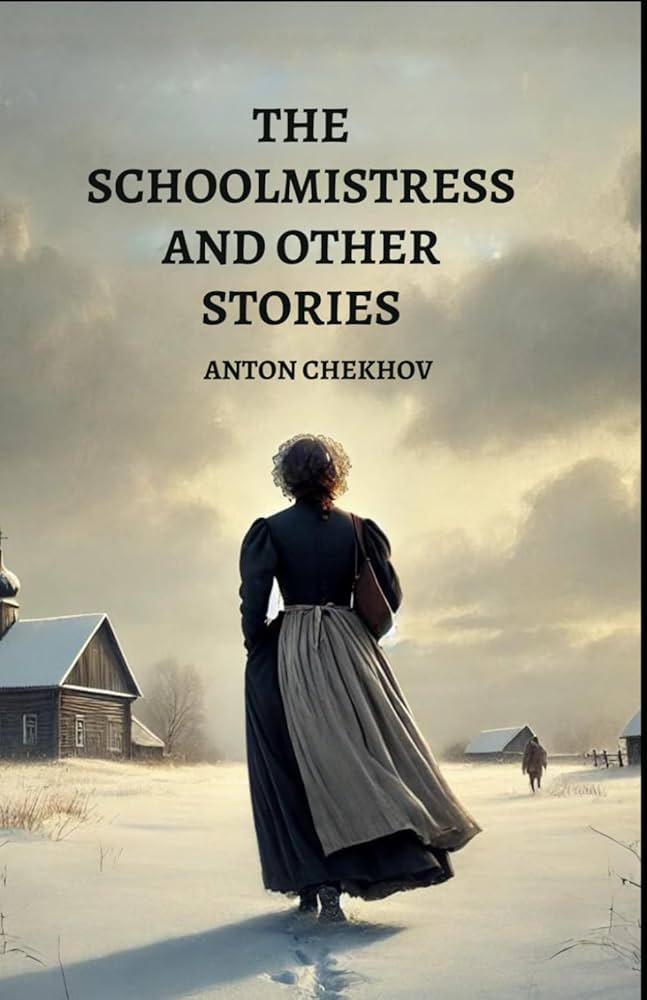THE SCHOOLMISTRESS
byThe Schoolmistress begins with Marya Vassilyevna traveling home after a school visit, trudging through muddy fields that reflect her tired spirit. Her mind drifts between worries about an upcoming examination and the recent arrest of a clerk, all while sitting opposite Hanov in the cart. Though they speak little, Hanov’s presence awakens in her a curiosity and a faint yearning, stirred by the contrast between his idle wealth and her laborious profession. She sees in him something she might never have: freedom from the endless cycle of tasks and duties. The countryside around them seems to echo her state of mind—gray, sluggish, and always demanding more than it gives. Even the sight of blossoming spring fails to lift her mood, as her reality feels too deeply rooted in sacrifice. Her thoughts wander to lost youth, missed companionship, and the rare, quiet luxury of being noticed.
The conversation remains surface-level, but for Marya, it sparks a chain of deeper reflection. She sees herself as someone slowly fading, worn by the unrelenting years of service and forgotten efforts. Her complaints about the school’s management are not just about logistics—they mask her sorrow for the life she never had. The loneliness of her position becomes painfully apparent. She teaches children, yet feels unseen. She mentors minds, yet receives no emotional support in return. As the journey progresses, her fatigue becomes more than physical—it’s existential. The muddy road becomes a metaphor for her years of labor, one step forward followed by two sinking back. Her feelings for Hanov are not romantic, but rather rooted in longing—for rest, for care, for something different.
The hardship she experiences is not unique to her, but it weighs uniquely heavy because she sees no end to it. Her brief, awkward interaction with Hanov lingers in her mind, not because he offers her affection, but because he reminds her of a path she might have taken. She imagines what life might have looked like in a city, with conversation, light, and dignity—things that feel far away now. Hanov, despite his flaws, seems to possess time in a way she does not. Her days are swallowed by others’ needs. The school, the board, her students, the routine—they all pull pieces from her, and no one offers to give something back. This inner reckoning surfaces quietly, not as anger, but as a soft ache.
During the last stretch of the journey, the weather turns rough, reflecting her internal discomfort. When the cart nears the river, she hesitates, both at the edge of the water and at the edge of her self-restraint. Crossing the river becomes a symbolic act—braving nature, braving exhaustion, and braving her own life’s inertia. Hanov’s indifference as he departs speaks louder than any goodbye. Marya is left to continue on foot, soaked and silent, her thoughts heavier than her wet clothing. Still, she walks. There is no dramatic ending, just the repetition of duty, tomorrow waiting with more mud, more letters, more forgotten effort.
In her silence and perseverance, Chekhov writes a quiet tragedy—the story of those who give all they have to systems that rarely notice them. Teachers, especially in neglected places, often carry the weight of entire communities on their shoulders without thanks. Marya’s story sheds light on that reality. It reminds us how easy it is to overlook the lives of people who serve, and how profound their inner worlds can be. Her resilience is not heroic, but it is deeply human. The beauty of the story lies not in what happens, but in what’s felt—and in the spaces between words, Chekhov invites us to listen.

